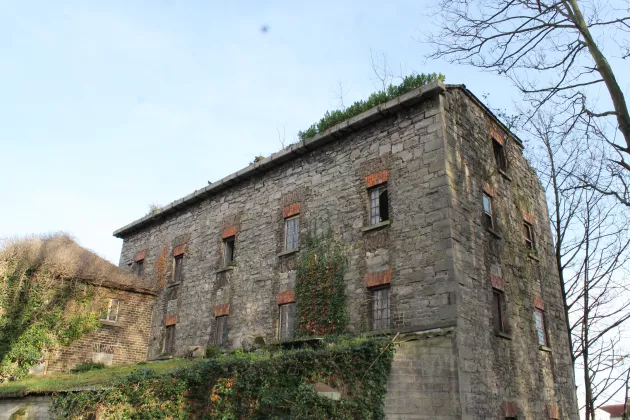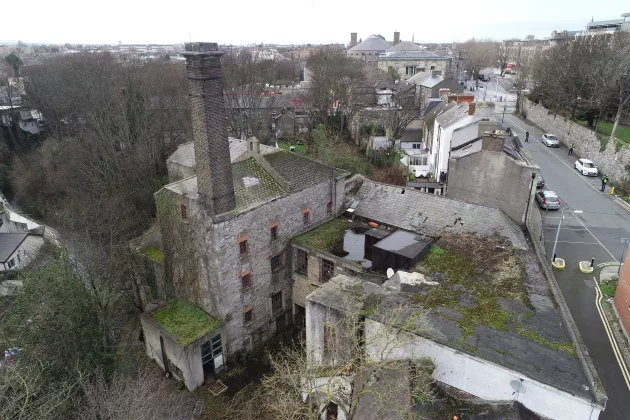Kilmainham Mill
The Kilmainham Mill complex sits in the heart of Kilmainham, over-looking the River Camac.

The Kilmainham Mill complex sits in the heart of Kilmainham, over-looking the River Camac. It consists of early nineteenth to mid twentieth century buildings with an adjacent, infilled mill-race, and is a protected structure. It served as a flour mill throughout the early nineteenth century, prior to conversion for textile production at the turn of the century. It ceased all industrial use as a mill in 2000 and has remained unoccupied since that time.
In December 2018 Dublin City Council purchased the Mill and will now commence a redevelopment project. The conservation project will ultimately open the mill to the public creating a cultural hub in the Kilmainham area.
The Mill is a Protected Structures on the RPS and is a recorded monument. Kilmainham Mill was originally built circa 1800 and functioned as a flour mill. Various additional buildings have been added to the site dating from1856. The result is a significantly large complex of buildings, an infilled mill-race running adjacent to the river Camac. The Mill changed use from flour to cloth production in the latter part of the 19th century and continued in this use until it closed in 2000. The Kilmainham mill complex appears to be the last remaining largely unaltered early nineteenth century flour mill in the city of Dublin, and is likely the last remaining fulling (textile) mill in Ireland. Following its closure the Mill complex fell into disrepair and dereliction.
The long term strategy is for DCC to develop ideas and put in place an implementation strategy for the sustainable development of a new cultural destination at Kilmainham Mill in consultation and agreement with stakeholders. The complex could act as a community hub, simultaneously telling the story of the mill’s industrial heritage whilst providing a significant visitor/tourism experience, interactive industrial opportunities for employment and craft production. Additional amenities, such as civic and outdoor green space could provide a recreational hub.
The overriding approach to the project will be to ensure the conservation of the building and its historically significant features, whilst developing a state of the art industrial amenity, creating a cultural hub in the Kilmainham area of the city, which also includes the Kilmainham Jail, The Royal Hospital, the War Memorial Gardens and Richmond Barracks.
Following purchase of the Mill complex by DCC a range of surveys were completed for the buildings which have determined that essential stabilisation and repair works now required. The works will provide safe access to the building complex for the first time and allow DCC to begin the process of developing and implementing the long term strategy. Following an open Tender process DCC recently appointed Tolmac Construction Ltd to carry out the stabilisation works.
The works consist of -
- Essential roof repairs to make the building dry and prevent further damage and decay due to water ingress.
- The propping of floors to allow for safe access and further restoration and refurbishment.
- Demolition of late 20th century out-buildings with no historic significance
- Removal & treatment of asbestos, which is throughout the building, on pipework, roof tiles, floor tiles etc
- The clearance of debris, including pigeon guano etc.
- The protection of existing industrial mill machinery throughout.
The works began this week on site and will be completed in the Spring of 2023 at a cost of €1.7m. The works are being overseen for DCC by a design team led by Howley Hayes Cooney Architects, assisted by structural engineers, industrial heritage expertise, archaeologists, ecologists etc.
